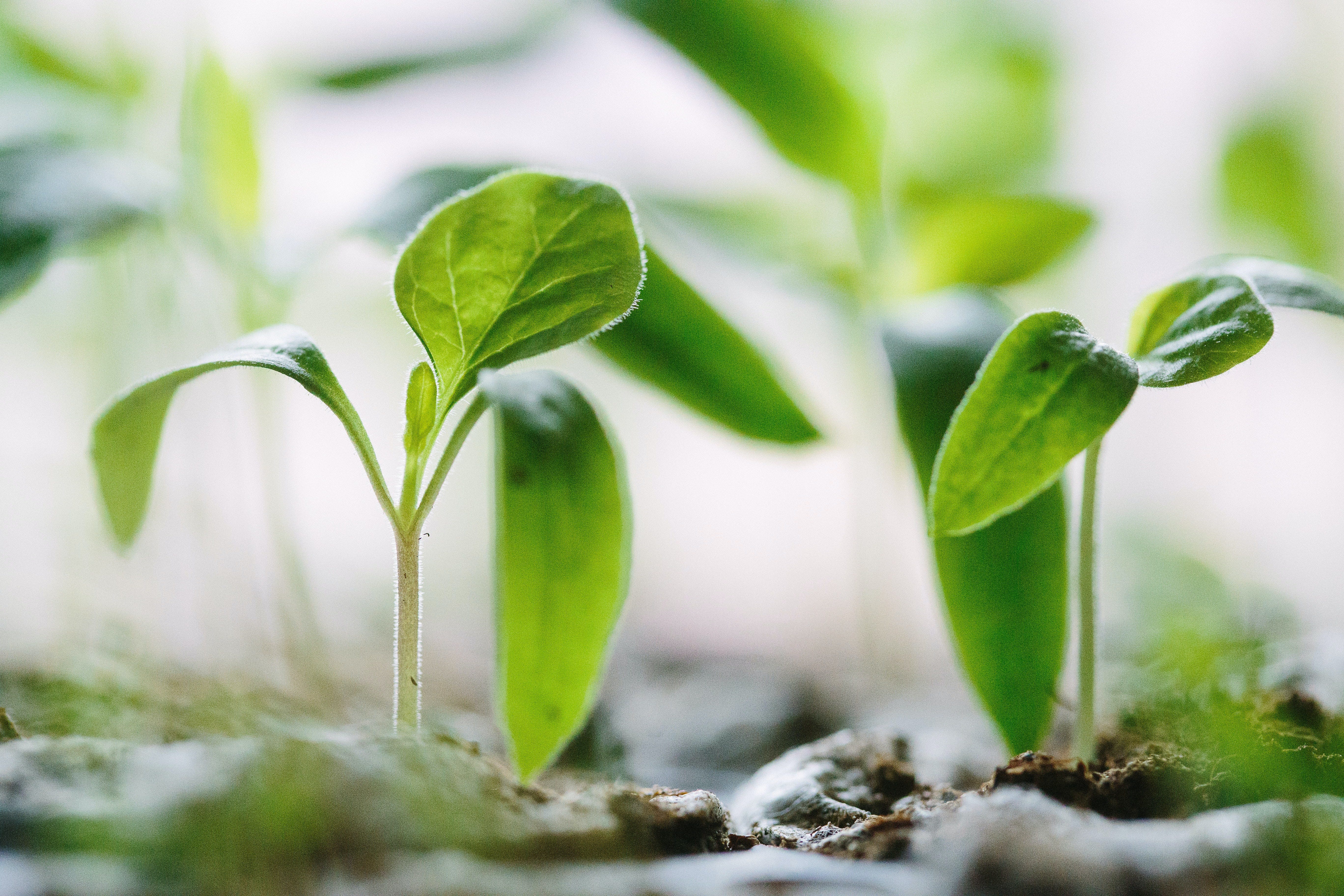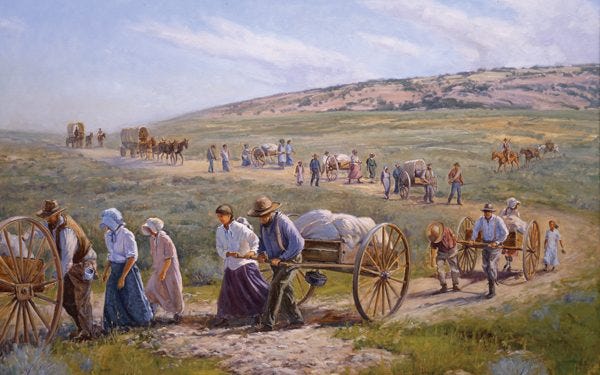It’s time to become Native to this place.
Image: Familysearch.org
“Many descendants of the new arrivals act like they still have one foot on the boat, like they’re just going to be here for a while, take what they can, and go somewhere else. Where will they go?” Native American elder as told to Robin Wall Kimmerer Ph.D. in Braiding Sweetgrass.
“I think the most important thing is to create a self-sustaining city on Mars. I think that’s the critical thing for maximizing the life of humanity; how long our civilization will last.” Tech billionaire Elon Musk
Elon Musk is a dangerous madman. He’s also a true pioneer. He believes people, especially rich white people, can take whatever they want from whomever and wherever they want, and then move on. In this, he follows a 500-year tradition of exploration, exploitation, and growth, a mindset that has led to enormous wealth and wholesale destruction of life on planet Earth.
We can’t be pioneers anymore. If we want to survive, we need to learn how to be natives: how to conserve, love, and sustain the places in which we live.
To see how the pioneer spirit plays out in real life, look at the history of forests in America. Europeans came to America and started cutting down trees to build houses and plant farms. When the trees were gone in one region, they moved to new parts of the country. Now, according to the TREE Foundation, only a vanishingly small area of the original forest is left.
Other continents have had similar histories of deforestation. As a result, countries around the world are becoming dryer and less fertile, deserts are spreading, and the world is getting hotter. It’s not only forests; pioneers mine the metals, confiscate the treasures, kill the animals, and exploit the land and people in whatever ways they can. But they don’t give back, so the land degrades until it can’t support them any longer. Then they need ever-greater inputs of chemicals and technology to maintain their way of life. Or else they move on.
But now, we have no place else to go. Rocket trips to a cold, dead planet won’t help. We must learn to live together on Earth, share and care for the living systems that keep us going. We must learn from indigenous societies who know how to live with Nature, instead of killing them or forcing them to live as we pioneers want them to.
What motivates pioneers?
Who leaves their home to colonize a strange place? Immigrants leave because they have to. They’re persecuted for their beliefs or desperately impoverished, and they want their families to survive. Pioneers explore because they want to. Spanish conquistadors like Hernando de Soto explained their motivations as “God, gold, and glory.”
First of those was gold (or silver, ivory, spices, or whatever could enrich the explorers,) which native people were enslaved and tortured to obtain. According to National Geographic, “The opportunity to make money was one of the primary motivators for the colonization of the New World.” Glory was also a big thing: successful conquerors would be rewarded with titles and prestige when they got home. The God part involved bringing Christianity to Native peoples to save their souls and teach them to better serve their conquerors.
Some pioneers may plan to stay in the lands they colonize, as the Puritans did in Massachusetts and the Zionists in Israel. Others want to grab the wealth and go, but very few want to learn the ways of their new land and live sustainably with it.
According to Native American botanist Robin Wall Kimmerer, the indigenous people of America lived in close relationships with neighboring plants and animals. They didn’t just take; they gave, learning how to help forests and fish thrive and feed them year after year. They regard all living things as people; animals and plants as their brothers and sisters, possessed of intelligence and feeling.
With its pioneer legacy and attitudes, modern industrial society considers such indigenous culture superstitious, unscientific nonsense. But it worked well enough for thousands of years until the pioneers came. We won’t last nearly that long.
Who becomes a pioneer?
Pioneering has its place. Plants were pioneers long before people, and pioneer (often called “opportunistic”) plants do some good work: they open up new areas for life. When they have colonized a space devastated by a forest fire or newly revealed by a retreating glacier, they start making soil there. Other plants and animals can then move in.
But opportunistic plants are hard to live with. Instead of cooperating, they try to out-compete other species. When pioneer species come to already-developed ecosystems, they can become invasive species, such as kudzu, that destroy native wildlife.
Pioneer people share some characteristics with pioneer plants. They’re likely to be adventurous and aggressive, and they can transform places they settle, sometimes in a good way, but usually, one that is harmful to the native residents.
Pioneers are often traumatized. They are usually dissatisfied, always wanting more. So, they are not good at fitting into society or an ecosystem. They often consider freedom, wealth, individual responsibility, and private property their highest values, while failing to cooperate with other humans or non-humans.
The opposite of a pioneer species is an old-growth forest or wetland. There, species interact with each other in dozens of ways, opening up hundreds of niches for different plants, animals, and fungi. They develop incredible diversity and beauty, and they can go on for centuries, with each individual creature succeeding within limits set by the whole.
Pioneers, though, don’t accept limits and move to escape them. Since we have run out of places to colonize on Earth, Musk thinks moving to a lifeless, nearly airless, and waterless rock will “maximize the life of humanity.” The man is reportedly brilliant and extraordinarily successful, but somehow he cannot see the millions of ways that Nature makes life possible and enjoyable on Earth, including making water and air, breaking down wastes, and building up nutrients. He seems to think people manage the world with our big brains.
Colonizing Mars is not only impossible but insane. Even if you could live there for a little while with massive technological support and supplies from Earth, who would want to? There’s nothing there. But investing in Mars seems more reasonable to Musk than trying to live sustainably on the planet that gave us birth.
People like Musk and the even wealthier and more-unhinged Jeff Bezos, who reportedly believes humans can live in eternally orbiting space ships, are menaces to all Life. They block the changes we need to take care of our mother Earth. We can’t live without her. Nor should we want to.

Becoming Natives
People who descended from pioneers, invaders, immigrants, or refugees, can never be truly indigenous to a new place. (Not sure about descendants of slaves.) But according to Kimmerer and others she cites, we can all become “native to a place,” meaning “to live as if your ancestors were from here and live as if your grandchildren are going to grow up here.” We can remember that we are part of the land, and the land is part of us. Here are some ways she advises:
Give thanks — Be grateful to Nature every day for its countless gifts. But gratitude is not enough. We must also:
Give back — plant things, protect them. Get involved in restoring habitats and ecosystems. This might be difficult in cities, but city dwellers are growing food and creating wildlife habitats there. We can educate; we can give political support; we can donate. Or plant a garden or a tree.
Advocate for the Earth — study what could be restored in your area and tell people about it. Oppose expansion of industries, destruction of habitats, militarism, and war, the biggest environmental destroyers.
Conserve — Consume less; waste less. Take only what you need. Fight for a society where conserving is easy, such as having good public transportation.
Help other people and living things — share and take care of those in need. Close prisons; establish a universal basic income (UBI) and an ecological jobs program, which would replace destructive jobs with work that renews the land, infrastructure, and water.
Avoid toxic chemicals — Oppose their use and manufacture, whether industrial, agricultural or for housecleaning. Don’t use them yourself. They poison plants, animals, land, water, and us.
Study — Learn about nature from books, websites, elders, and by interacting with animals and plants. You’ll appreciate them more when you know them better. Learn from indigenous teachers when we can.
Spend time in Nature — again much harder in cities, but even a few minutes observing pigeons can teach us things and make us feel more connected to the living world. And when you look, you might notice there is a lot more Nature around than you realize.
This is not about capitalism vs. socialism or about taking shorter showers. It’s about remembering in our hearts where we come from, loving our world as we love ourselves, and fighting for it against a system that is killing it.
And finally, take care of yourself. Give love to your body, the greatest gift Nature has given you. Don’t focus on accumulating things; enjoy life. We are not going to Mars or anywhere else. We need to live as if we belong here.
Read more: Kimmerer, Robin Wall Ph.D., Braiding Sweetgrass
Some great interviews with Dr. Kimmerer
Thanks for reading! Follow me on Twitter, on Facebook, or on Medium.com. Hire me for freelancing, editing, or tutoring on Linked In


Hmm — maybe delivering meals by car is not what is prescribed! Alas, I am stuck with my job, but you make many good points and I particularly like the Musk vs indigenous peoples meme. Farmers are changing their ways, but too slowly. Non-destructive farming is more profitable, but the transition is costly. That’s where government could provide the money to bridge the change. Tricky, though, because every farm is different, and the government has a hard time dealing with details.
Good points Roger. If restorative farming became the worldwide norm, much environmental damage could be reversed. But I guess that would mean a billion or so people moving from cities back to farms. For any of these changes (transportation, employment, policing etc.) we would need a government that could inspire most people to change and come up with competent plans for implementing.